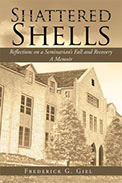
 |
Shattered Shells: Reflections on a Seminarian’s Fall and Recovery, A Memoir
by Frederick G. Giel
Xlibris
The comprehensive nature of this work, particularly where Giel painstakingly establishes his family history and unique perspective on historical events like JFK’s assassination, is further accelerated by the electric energy that imbues the memoir upon the onset of Giel’s seminarian experience and which remains throughout. After declaring his commitment to seminary life at age seven, the author follows through by becoming a seminarian at Holy Cross Seminary on the University of Notre Dame campus at the youthful age of fourteen. Many thought-provoking moments and ideas fill this memoir; however, one that resonates is the reality that Giel’s seminary life—and his subsequent attempt to relinquish the material world—was taking place a mere one mile down the road from his family home on Diamond Avenue. The details of the first day in the seminary, from the fourteen-minute prayer to the lost glasses are both highly entertaining and insightful.
It’s clear from the start that Giel could be considered a misfit, but to see the numerous experiences that lead to this realization for him is remarkable. Considering that he was fourteen years old when he entered the seminary, it is both humorous and profound to see the juxtaposition of the desire to attain women and intimacy with living a life of celibacy and complete abstinence from the material world. Moreover, Giel’s rebellious nature in youth and questionable companionship, succinctly captured in the must-read chapter on “Gourmet Garbage,” lands him in one precarious situation after another, ultimately paving his way out of the seminary and toward a career as a lawyer. Giel’s writing during the courtroom drama portion is stellar and engaging, but readers will likely find themselves gravitating toward themes of love, death, and the life that is lived in between these two worlds.
RECOMMENDED by the US Review